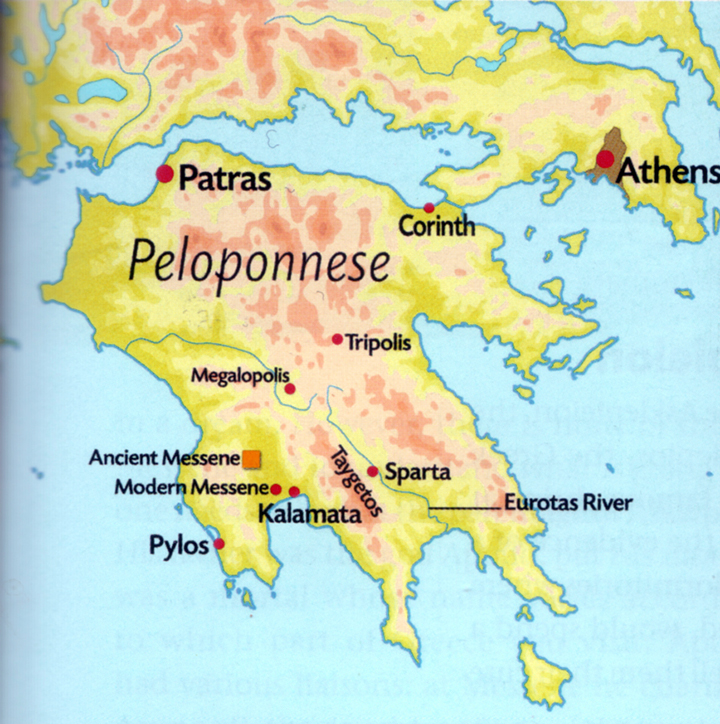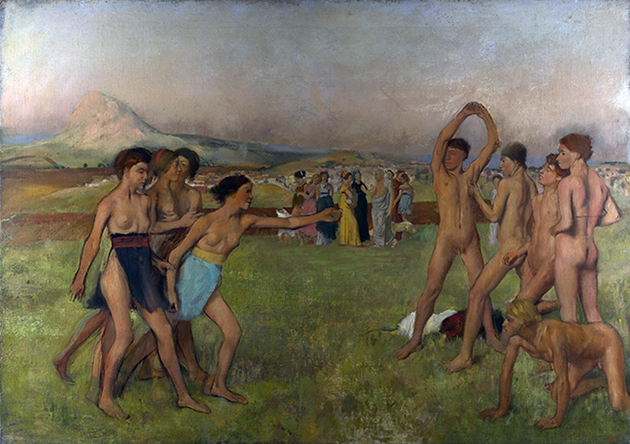Southeastern branch of Peloponnese ending with peninsulas of Malea and Tainaron was the ancient Laconia. Its most productive part was the valley between the river Eurotas, between the massifs of Taygetus and Parnon. The oldest documented name of this area was Lacedaemon – province and the capital of Menelaus. According to legend the most famous Lakedemonians were children of Zeus and Leda: Helen, Clytemnestra (wife of Agamemnon, Electra and Orestes mother) and the twins Castor and Pollux.
Before the end of the second millennium, Dorians conquered most of the Laconia and founded their settlements. In the time between the 11th and 9th centuries BC Sparta was developed by uniting 4 neighboring villages (Pitane, Limnai, Mesoa, Kinosoura) and the city of Amikles. Before mid-8th century BC Spartans won the remaining part of Laconia, and before the 6th century BC by severe and persistent struggles they occupied fertile Messene (Spartans led by King Theopompus occupied the land from Messenians led by Aristodemos). They had military expeditions to the north, to the Argolis, Arcadia and Elis. In the meantime, Sparta – Lacedaemonian polis – has developed in the military aristocratic oligarchic government in which the upper class was warrior landowner.
Spartan Classes population of Lacedaemonian state was divided from the oldest time in three classes:Spartiates (the upper class), Perioikoi (The Middle Class) and Helots (The Lower Class and some slaves). Spartiates were the descendants of Dorian invaders and Perioikoi and Helots were representatives of the diverse populations found, conquered by Dorians and gave them a different conditions of life.



Spartiates were Lakedaimonios, residents of the Sparta, landowners and warriors who had all the power in Lacedaemonian country. They shared in 3 phyles: Hylleis, Pamphyloi, Dymanes. Each Spartiaten originally belonged to one of three phyle.
According to legend, the king Lycurgus divided the Spartan country in 9000 parts, by population, so that each Spartiates had a chance to enjoy on one part of land (klaros). After the conquest of Messenia each spartan family got to enjoy one klaros in Sparta and one pitch in Messenia. All that Land stock (state-civil country) was the collective property of all Spartiates and was not allowed to others. Spartiates from their klaros each year they were getting established part of the harvest, the result of helots labor. All Spartiates among themselves were the same. The oldest son inherited klaros, while other sons and daughters were uninsured.



Spartiates were connected by the common interest, and the most – fear of the oppressed helots. Therefore, they were always in the military preparedness. In order to qualify for the military and military statesmanship function, Spartiates were from early childhood prepared for this special education. Their child was brought up with the parents until he was seven years old, and then he was sent to the state military nursery, collectively with other children. In the nursery, children were according to age and the phyle placed in classes and troops. Year after year they switched to the new formation, until they were 22 years old when they left the Institute as a trained warriors. Being educated (Agoge), the young Spartiates were accustomed to obedience, endurance, sacrifice, courage and resourcefulness. In order to achieve it, boys in military camp were modestly fed, laid on the hard bed, practiced bald, barefoot and naked. Shame was to show the slightest sign of pain. They were monitored and controlled. They read and wrote not so much, they learned by heart the heroic songs. They were asked to correspond short and concise (laconic response). After completing military training every Spartiaten was included in one system performance (group of fifteen soldiers who were fed together and were inseparable in peace and war).
Perioikoi were free citizens in Lacedaemonian state who lived in Sparta as craftsmen and traders, and were considered as foreigners, and on their own territory (perioikis) outside of Sparta they had the autonomous towns and villages.
Perioikoi were on their territory engaged in farming, cattle breeding and handicraft. They paid big taxes to the state. They served together with Spartiates in the army, but they could not reach senior military positions.
Helots were subdued residents of Lakonia and Messenia that Doric invaders and their descendants overcame and made their halfslaves or serfs. Helots lived in villages on Spartiaten country in Lakonia and Messenia. As a country, they were collectively owned by the state and served to individual Spartiates who worked on the land.
